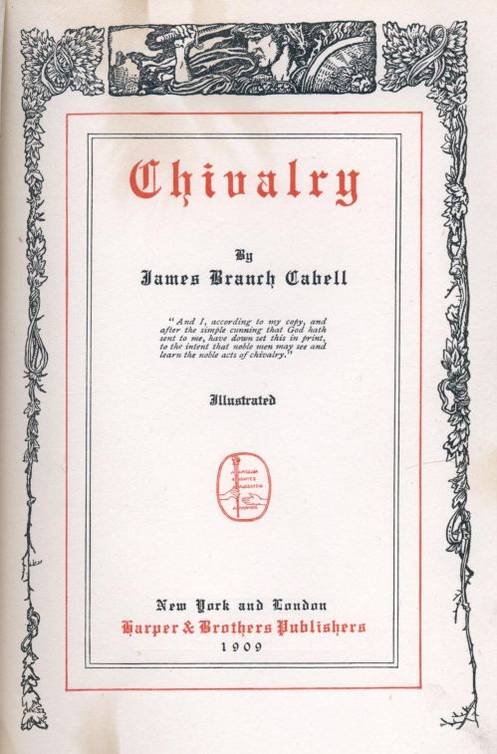Imprimis, as concerns the authenticity of these tales perhaps the less debate may be the higher wisdom, if only because this Nicolas de Caen, by common report, was never a Gradgrindian. And in this volume in particular, writing it (as Nicolas is supposed to have done) in 1470, as a dependant on the Duke of Burgundy, it were but human nature should our author be a little niggardly in his ascription of praiseworthy traits to any member of the house of Lancaster or of Valois. Rather must one in common reason accept him as confessedly a partisan writer, who upon occasion will recolor an event with such nuances as will be least inconvenient to a Yorkist and Burgundian bias.
The reteller of these stories needs in addition to plead guilty of having abridged the tales with a free hand. Item, these tales have been a trifle pulled about, most notably in 'THE STORY OF THE SATRAPS,' where it seemed advantageous, on rejection, to put into Gloucester's mouth a history which in the original version was related ab ovo, and as a sort of bungling prologue to the story proper. Item, some passages have been restored in book-form—pre-eminently to 'THE STORY OF THE HOUSEWIFE'—that in an anterior publication had been unavoidably deleted through consideration of space.
And—'sixth and lastly'—should confession be made that in the present rendering a purely arbitrary title has been assigned this little book; and chiefly for commercial reasons, since the word 'dizain' has been adjudged both untranslatable and, in its pristine form, repellantly outre.
You are to give my makeshift, then, a wide interpretation; and are always to remember that in the bleak, florid age these tales commemorate this chivalry was much the rarelier significant of any personal trait than of a world-wide code in consonance with which all estimable people lived and died. Its root was the assumption (uncontested then) that a gentleman will always serve his God, his honor and his lady without any reservation; nor did the many emanating by-laws ever deal with special cases as concerns this triple, fixed, and fundamental homage.
So here you have a chance to peer at our world's youth when chivalry was regnant, and common-sense and cowardice were still at nurse. And, questionless, these same conditions were the source of an age-long melee—such as this week is, happily, impossible in any of our parishes—wherein contended 'courtesy, and humanity, friendliness, hardihood, love and friendship, and murder, hate, and virtue, and sin.' So that I can only counsel you to do after the excellencies and leave the iniquity.
And for the rest, since good wine needs no hush, and an inferior beverage is not likely to be bettered by arboreal adornment, the reteller of these tales prefers to piece out his exordium (however lamely) with 'THE PRINTER'S PREFACE.' And it runs in this fashion:
'Here begins the volume called and entitled the Dizain of Queens, composed and extracted from divers chronicles and other sources of information, by that extremely venerable person and worshipful man, Messire Nicolas de Caen, priest and chaplain to the right noble, glorious and mighty prince in his time, Philippe, Duke of Burgundy, of Brabant, etc., in the year of the Incarnation of our Lord God a thousand four hundred and seventy; and imprinted by me, Colard Mansion, at Bruges, in the year of our said Lord God a thousand four hundred and seventy- one; at the commandment of the right high, mighty and virtuous Princess, my redoubted Lady, Isabella of Portugal, by the grace of God Duchess of Burgundy and Lotharingia, of Brabant and Limbourg, of Luxembourg and of Gueldres, Countess of Flanders, of Artois, and of Burgundy, Palatine of Hainault, of Holland, of Zealand and of Namur, Marquesse of the Holy Empire, and Lady of Frisia, of Salins and of Mechlin; whom I beseech Almighty God less to increase than to continue in her virtuous disposition in this world, and after our poor fleet existence to receive eternally. Amen.'


